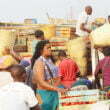President Edgar Lungu has appealed to the diplomatic community in Zambia to continue supporting the Zambian government’s implementation of the Social Cash Transfer (SCT) because the challenges that gripped the scheme last year have firmly been dealt with.
And President Lungu has expressed optimism that Zambia’s annual rate of inflation is expected to be maintained within single digits this year at between 6 to 8 per cent on the back of an expected good maize harvest in April.
Speaking during the occasion of the annual Presidential greeting of the diplomatic corps, President Lungu told diplomats accredited to Zambia to continue supporting the social scheme meant to benefit the poor and vulnerable in society.
Last year, at least two notable donors, including Britain and Sweden, abruptly cut off funding the SCT following widespread abuse of funds meant to be channelled to the poor, elderly and vulnerable in society.
Subsequently, the Head of State dropped his former Community Development Minister Emerine Kabanshi, who is currently in court facing abuse of office charges, in the wake of the scandal.
“…Regarding social protection, the Zambian government will continue to implement the Social Cash Transfer scheme, food security pack as well as women and youth empowerment programmes, even in the midst of tight fiscal conditions. I wish to assure you that the challenges, which were experienced in this area, were appropriately dealt with in the past year. Therefore, I wish to encourage you, our partners, to continue with your goodwill on such progressive and humane initiatives. I am confident of your continued support going forward,” President Lungu said.
He also called for continued collaboration in the energy sector to accelerate efforts at narrowing Zambia’s huge power deficit, which still stood at over 800MW.
“Given the energy deficit Zambia is facing, the government will aim at enhancing the sector by, among other ways, encouraging investment, and diversification to include alternative sources, such as solar and wind. This calls for concerted collaboration within the SADC region and beyond through pooling of resources, exchange of best experiences, transfer of technology, capacity building, and encouragement of foreign investment in the region’s energy sector. I am optimistic that in this manner, the energy situation will improve on a large scale for all our countries,” he added.
And the Head of State expressed optimism that Zambia’s annual rate of inflation would be maintained within the 6-8 per cent range on the back of an anticipated good maize harvest this April.
The annual rate of inflation currently remains in double-digit territory at 11.7 per cent.
“At this juncture, I am happy to announce to your Excellencies that the economic prospects for 2020 are positive. Projections include a real growth rate of 3 per cent and inflation to be maintained within the range of 6 to 8 per cent. In addition, the fiscal deficit is expected to reduce to 5.5 per cent and domestic revenue mobilization is projected to increase to at least 22 per cent of Gross Domestic Product (GDP). Fiscal consolidation will continue to be a priority to ensure sustainable and inclusive growth,” said President Lungu.
“I am happy to announce that the projections indicate that the country has sufficient maize stocks to last up to July, 2020. Harvests are also expected in April from the early maize project facilitated by government in partnership with the Zambia National Farmers Union (ZNFU). My government is grateful to our cooperating partners for supporting our efforts to enhance the country’s food.”
Meanwhile, giving a vote of thanks, Mozambique High Commissioner Jerónimo R. J. Chivavi observed that climate change remained a threat that transcended national borders, hence the need to intensify international collaboration.
“After several difficulties, today, the world is facing a serious conflict that we all know resulting from the pressure of climate change, whose negative effects leave no one behind, not even the most advanced states. Climate change has affected all of us, destroys the social and economic status of our countries and families, and if we do not confront it seriously, all the effort we have put in building our states will go to waste,” said High Commissioner Chivavi, who is also Dean of the Diplomatic Corps.
The annual Presidential greeting of the diplomatic corps is an occasion to collectively review, at national, regional and global levels, the achievements and challenges of the past year, while outlining foreign policy and charting the course of the New Year ahead.













2 Responses
I urge the donors not to listen or even entertain Edgar lungu’s plea for support. They will loot it again.
Pride comes before a fall. Now you want donor funds. May be this should wait till after elections. This money could be used as a campaign tool.